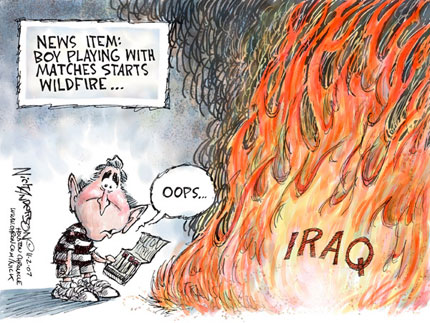Search
Democracy Links
Member's Off-site Blogs
playing with matches .....

from the Centre for American Progress
With President Bush determined to run out the clock and hand off his failed Iraq policies to his successor, progressives have been playing into the strategy by drifting away from their central principle that a timetable for withdrawal from Iraq best serves America's interests.
A new Center for American Progress Action Fund strategy memo by John Podesta, Brian Katulis, and Lawrence Korb, warns that heading into 2008, progressives are at risk of "drifting themselves into offering only a vague and muddled vision" for the future course in Iraq.
With casualty rates allegedly declining in Iraq, progressives have lapsed into complacency, losing sight of the fact that Bush's course is further than ever from achieving the strategic goal of national reconciliation. Instead, "progressives must provide a clear alternative to counter the Bush policy of strategic drift - one that takes back control of America's security interests."
Bush's escalation strategy has been unable to attain its primary goal of reducing violence to "help make reconciliation possible." While the administration has been trumpeting a trend of decreasing violence, Iraqi government figures obtained yesterday reveal that the "number of Iraqis killed in insurgent and sectarian attacks rose in October," illustrating how the administration is pushing claims that it is gaining "momentum" in Iraq while ignoring the pervasive volatility there. Although levels of violence are down from "pre-surge" levels, "there might be fewer attacks because you have ethnically cleansed neighborhoods," according to the Government Accountability Office. A recent report by the Special Inspector General for Iraq Reconstruction stated, "Despite reduced violence [since pre-surge levels], officials are pessimistic that lasting reconciliation is occurring" in Baghdad and surrounding provinces. Earlier this month, "several top Iraqi leaders say they have lost faith" in the prospect of reconciliation.
After Bush and his allies in Congress obstructed progressives' attempts to redeploy troops from Iraq, progressives "have drifted away from clear calls for redeployment and toward academic proposals and vague positions about what to do." This "strategic drift" is being abetted by leading "foreign policy thinkers" -- many of whom were wrong about going to war and wrong about how to deal with the war's first four years. Some progressive candidates have also defaulted to "strategic drift," wavering on whether they would redeploy all troops out by 2013. Others have slipped toward advocating proposals that focus on tactical measures, such as training Iraq's security forces or addressing the spillover effects of Iraq's internal conflicts on the region. Last month's Senate vote on a resolution suggesting a 'soft partition' model of Iraq is yet another sign of muddle and drift. Ultimately, "none of these proposals cut to the heart of the national security threats posed by strategic drift -- that the open-ended commitment of U.S. troops to Iraq is making Americans less safe and not resolving Iraq's internal conflicts."
The administration and the right wing have been escalating rhetoric on Iran, talking up World War III and directly threatening military action. Conservatives are sounding the war drums against Iran because they believe "that they fare well politically when they play to fear rather than reason." While conservatives try "to divert attention from Iraq," progressives need to keep the focus on redeployment. With nearly 170,000 troops in Iraq, a broken military, and potentially $2.4 trillion spent in public funds, a prolonged presence in Iraq has major implications for America's security. Furthermore, the public strongly demands a withdrawal. Seventy-two percent of Americans want the U.S. out of Iraq in two years, and a majority "do not believe Congress has gone far enough" in opposing the war. "Dems, progressives and the media have taken the [bait] on Iran. The reality is that we have 168,000 troops in Iraq not Iran," observes the National Security Network."Progressives should start with a firm statement that America will undertake a strategic phased redeployment of its troops in a defined period of time," the memo states. Without taking such a definitive stand, they risk drifting along with a policy that will have severe consequences for America's security. The memo also urges three practical steps that should taken to curb the slide into strategic drift. In light of Bush requesting an additional $46 billion for the wars in Iraq and Afghanistan, "progressives on Capitol Hill should seek to limit this funding by continuing to provide close oversight on the money requested." Progressives also need to continue stressing military readiness and advocate a diplomatic surge, "conceptually integrating Iraq into the broader problems of the region."
- By John Richardson at 3 Nov 2007 - 6:51am
- John Richardson's blog
- Login or register to post comments
Recent comments
1 hour 46 min ago
2 hours 2 min ago
3 hours 16 min ago
3 hours 26 min ago
3 hours 31 min ago
3 hours 34 min ago
4 hours 52 min ago
6 hours 54 min ago
13 hours 55 min ago
13 hours 59 min ago